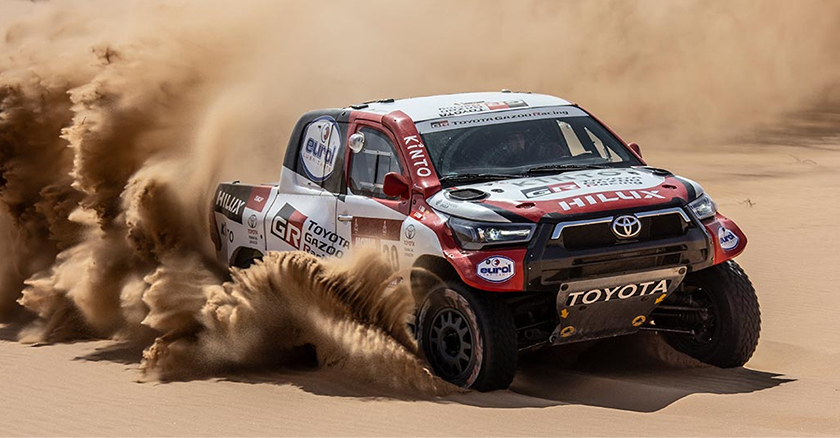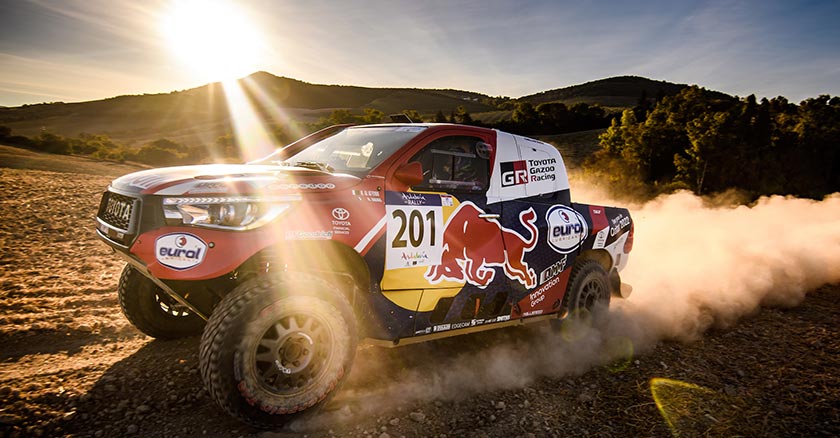NEWS
TOYOTA GAZOO Racing TO FIELD FOUR NEW HILUX AT 2021 DAKAR RALLY
TOYOTA GAZOO Racing will be entering four crews in the 2021 Dakar Rally, scheduled to start on January 3 in the Saudi Arabian city of Jeddah. The works team will consist of Nasser Al-Attiyah and navigator Mathieu Baumel; Giniel de Villiers and navigator Alex Haro; rookie Henk Lategan and navigator Brett Cummings; and Shameer Variawa and navigator Dennis Murphy.

The team, which has competed at the Dakar since 2012, will field a mix of highly experienced specialists, together with relative newcomers to the rally-raid world for 2021. This will give TOYOTA GAZOO Racing a strong attacking force in the form of Nasser and Mathieu; as well as Giniel and Alex, while building depth and experience in the form of Henk and Brett, as well as Shameer and Dennis. Since its first Dakar Rally entry, the team recorded best overall results of 3rd (2012), 2nd (2013), 4th (2014), 2nd (2015), 3rd (2016), 5th (2017), 2nd (2018), 1st (2019) and 2nd (2020).
As in 2020, the team will be spear-headed by 2019 winners Nasser and Mathieu, who finished second in the 2020 edition of the Dakar Rally. During a truncated 2020, they secured victory in the Rally of Andalucía and Nasser will be aiming to add to his tally of three Dakar wins. Giniel and navigator Alex will be hoping to build on their 2019 victory in the Rally of Morocco, which Giniel has won three times.

South Africans Henk and Brett will be joining the squad for 2021. While this will be Henk’s first Dakar Rally, he recently secured the highly competitive South African Cross-Country Series (SACCS) title for a second consecutive time and will be aiming to learn as much as possible from his first visit to the Dakar. Navigator Brett has competed in the gruelling race twice before in the motorcycle category, recording a second place in what was then known as the Malle Moto category for unsupported motorcycle racers in the 2014 edition of the race.
Finally, Shameer and Dennis, also from South Africa, will complete the four-car team. Shameer, who has won local championships in South Africa in the past, has taken part in the Dakar Rally before, but this will be his first outing with TOYOTA GAZOO Racing. Navigator Dennis has worked at the race in a technical capacity for the team in the past and is a multiple South African national champion navigator, but this will be his first time navigating in the Dakar Rally.
The team will compete in the latest version of the Toyota Hilux, built and developed at the team’s HQ near the iconic Kyalami Grand Prix Circuit in Johannesburg, South Africa. The current car is based on the race-proven Hilux that was introduced in 2018, and features a mid-mounted engine, independent rear suspension and all-wheel drive. The car has seen significant refinements over the years, and its results on the Dakar Rally serves as proof of the reliability and toughness associated with the Hilux. Its first outing saw the team achieve a second and third place in 2018, followed by and overall victory in 2019 and second place in 2020.

The car has seen substantial development thanks the team competing locally in the SACCS. This allowed TOYOTA GAZOO Racing Dakar Team Principal, Glyn Hall, to refine the car on an ongoing basis, while getting valuable feedback from both Giniel and Henk in race conditions. For 2021, the overall layout and geometry of the car remains unchanged, but refinements to the suspension and the naturally aspirated V8 engine have ensured that the latest version of the Hilux is as competitive and reliable as ever.
The 2021 edition of the Dakar Rally will again take place solely in Saudi Arabia, with crews setting off from the city of Jeddah on January 3. The 2021 route will traverse similar terrain to that encountered on the 2020 edition, but the organisers have promised all-new sections the ensure a competitive race. The traditional rest day will take place on January 9 in the city of Ha’il, before the route loops back to Jeddah for the finish on January 15. The 2021 route is also expected to feature two looped stages which start and end at the same place, as well as the traditional Marathon Stage which competitors will have to complete without an overnight return for service in the bivouac.
A new digital roadbook will be introduced for the 2021 edition, with the route only made available right before the start of each stage. This approach was trialled for select stages at the 2020 Dakar Rally but will become the norm. This new format not only adds an extra level of unpredictability but also makes the entire process easier to administer and control by race officials.
